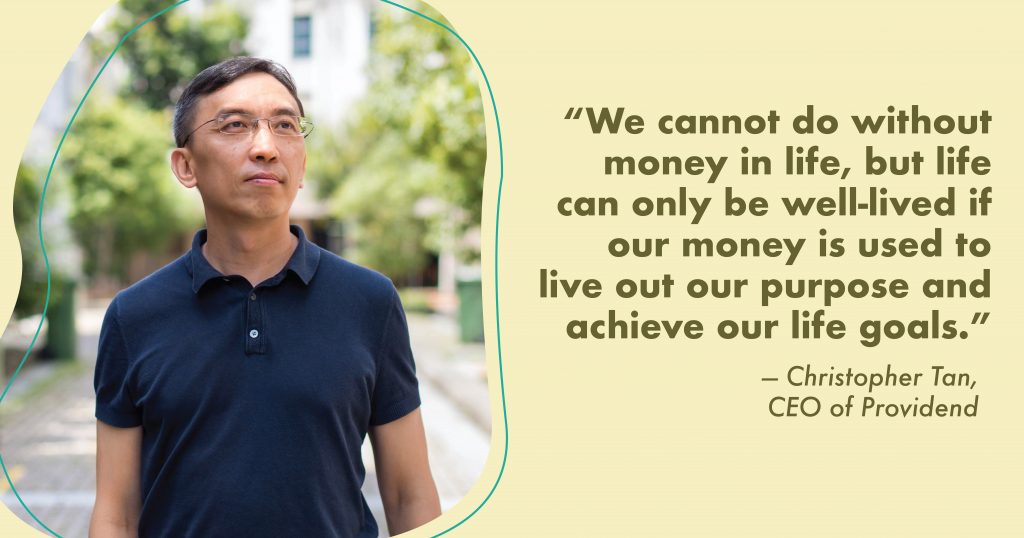21 Oct 2022
SOURCE: CPF Board

“From young, my father has always been there for me whenever I needed him. He has been a mentor, an encourager, a pillar of strength for all of us at home. He provided our family with everything we needed materially and loved us unconditionally. I will always remember the yearly holidays he brought us on. Those were fond memories.
My father also taught us how to be good people. He showed us what filial piety is when he took care of our grandparents and loved them when they were still around. He never failed to show up for his friends when they needed him. He had a generous heart, and always gave to charities and good causes.
But perhaps, my father will be most known to all as a man with the strong conviction of always doing what is right, and having the resilience to withstand all difficulties just to live out his convictions. That life purpose of his, as well as his values, is an inspiration to many. Now that he is gone, he left behind a legacy that we will all remember. We miss you very much, Pa.”
This is the kind of eulogy that I wish my children will write for me when I pass on one day.
You will notice that there were no mentions of money, only what I want them to remember me for and the legacy that I wish I will leave behind for them.
But I will be fooling myself to think money had no part to play in the many memories and legacies that I wish I can leave behind.
This is because many of these things can only be possible if there was money to enable it. Money is a common thread that weaves through every aspect of our lives. So, we cannot do without money in life, but life can only be well-lived if the money that we have is used to live out our purpose and achieve our life goals.
Thus, it is important for us to first make life decisions before we make money decisions. For if we make money decisions first, and adjust our lives to support our money decisions, our lives can be miserable.
For example, if we buy an expensive car and a big house that we don’t need, with the money that we don’t have (so we overly borrow!) to impress the people we don’t even know, we may even have to work in a job that we don’t like (that can affect our health), which takes away our time from our family – all of that to support the money decision to buy that car and house.
This may cause our life to become a disaster!
So, how do we first make life decisions?

It starts with answering the question: “What is my purpose in life?”, or “What do I want my purpose in life to be from now on?”, or “What do I want others to say about me when I am no longer around?”, or even “What will make me truly happy?”.
Once we have answered one or all of these questions, we can then begin to set our life goals and plan our activities that will help us live out our purpose and achieve our life goals.
Many of the activities will need money to enable them, and we can then make money decisions to do so. Our money decisions may mean that we need to accumulate more. But sometimes, it could also mean deciding to simplify or declutter our life to spend less.
Many times, we may even discover that we already have enough today to live the good life.
In their book, Repacking Your Bags, Richard J. Leider and David A. Shapiro defined the good life as “Living in the place you belong, with people you love, doing the right work, on purpose.”
From this definition of a good life, you will realise that planning is not just about living a life in the far future. We can’t delay the pursuit of our purpose only when we retire, because we never know when we will die!
Also, living out our purpose is not a single event; it is doing life the way we purpose it to be, throughout the time we have on earth.
Therefore, in making money decisions, we need to consider how we can live our life today, to build memories, and do all those important things now, because some things in life cannot and should not be delayed.
But at the same time, we must make sure we plan financially to live the good life in the future.

Dr Raymond Yuen was a 65-year-old, Hong-Kong-born Singaporean doctor who had practised as a General Practitioner for 30 years in Macpherson, an estate with many low-income families and seniors. On 9 October 2021, Dr Yuen succumbed to Covid-19.
When news broke of his untimely death, many came forward to pay tribute to him. He was remembered as a kind and truly caring doctor who deliberately kept his charges low to help the needy in the area, and would go out of his way to help people who needed anything extra.
He used to give extra time to patients who were concerned about or did not understand their illnesses, or who just needed attention. Not only his patients loved him for his kindness; even his domestic helper remembered him as a good man.
His helper, Sujeewa, recounted how Dr Yuen paid for her healthcare courses, which enabled her to be certified to work in his clinic. He even brought her entire family to Singapore, put her daughter through school, and provided a house for them.
Dr Yuen first made his life decision to show care and kindness to his patients and all who were around him. He put his money decisions second. For that, he lived his one life with purpose to impact many lives, and left a legacy which his family can be proud of.
What life decisions do you need to make today, before you plan for your finances to support them?
Christopher Tan is CEO, Providend Ltd, Singapore’s first and probably sole fee-only comprehensive wealth advisory firm. He is also author of the book “Money Wisdom: Simple Truths for Financial Wellness”.
Information in this article is accurate as at the date of publication.


